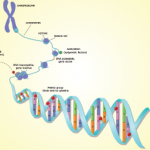When the researchers performed a differentially variable position analysis, they found greater heterogeneity of DNA methylation within the group of patients diagnosed with undifferentiated arthritis at baseline compared with patients with RA or healthy donors. The investigators noted that this higher variability of the methylation profiles in the samples from patients with undifferentiated arthritis at baseline relative to healthy individuals was consistent with the clinical heterogeneity of patients with undifferentiated arthritis.
When the team then compared the baseline DNA methylation profiles to the clinical groups defined one year later (either undifferentiated arthritis or RA), they identified 12,381 hypermethylated CpGs and 4,159 hypomethylated CpGs in the individuals who maintained a diagnosis of undifferentiated arthritis compared with those who evolved to a diagnosis of RA. The differentially methylated positions in the hypermethylated cluster were enriched in areas related to antigen presentation through major histocompatibility complex (MHC) class I, as well as inflammatory cytokine signaling. When the team analyzed transcription factor binding motifs in the hypermethylated cluster, they found enrichment of motifs belonging to BHLH and Zf families. The hypomethylated cluster showed enrichments of transcription factors from ETS and Zf families. Taken together, the results suggest a pre-established epigenetic signature exists in patients with undifferentiated arthritis who will evolve to become patients with RA.
The investigators further characterized the subgroups of patients diagnosed with undifferentiated arthritis at baseline and compared the DNA methylation profiles of these patients with those of terminally differentiated patients with RA (i.e., those diagnosed as RA at baseline). Their data again supported the hypothesis that a pre-existing, RA-like epigenetic profile occurred in some patients with undifferentiated arthritis who then progressed to a diagnosis of RA.
“The most interesting finding for the team was the fact that patients display differential DNA methylation markers before they acquire a final clinical diagnosis,” Dr. Ballestar says, adding that the alterations may not be clinically visible at the baseline visit when the initial undifferentiated arthritis diagnosis is made.
Predictive Marker of Disease Progression
The researchers then investigated the possibility of using DNA methylation data to obtain predictive markers of disease progression. They found the highest precision occurred using a support vectors machine-generated model. This supervised learning model analyzed data, including rheumatoid factor and disease activity score 44 (DAS44), for classification analysis. The investigators found the addition of the CpG methylation data improved the predictive ability of clinical parameters. Thus, the authors propose a machine-learning strategy for DNA methylation-based classification may predict the evolution of patients with undifferentiated arthritis toward RA.

